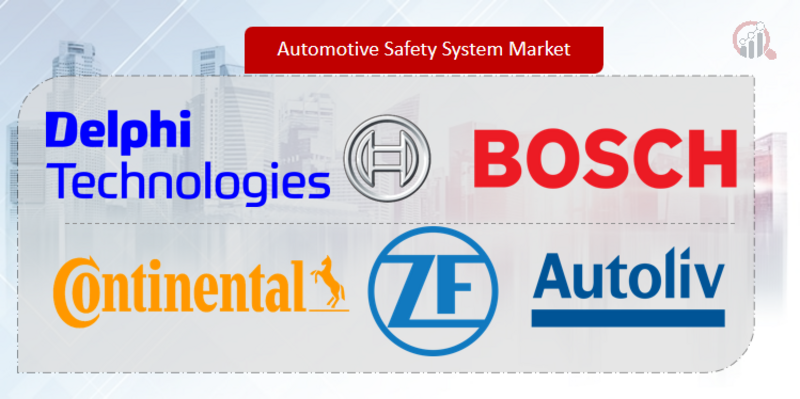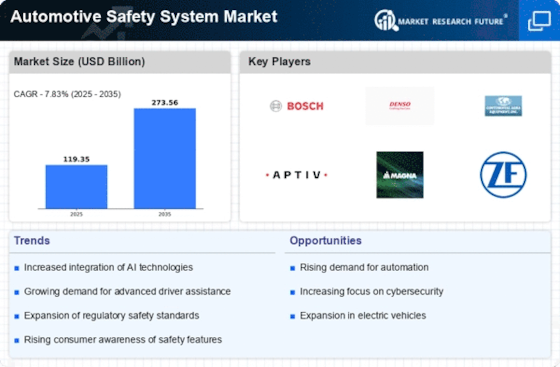Top Industry Leaders in the Automotive Safety System Market

Exploring the Competitive Dynamics of the Automotive Safety System Market
The automotive safety system market is currently experiencing unprecedented growth, fueled by an unwavering commitment to passenger safety, stringent regulatory standards, and continuous technological advancements. This sector is witnessing intense competition, with both established industry giants and innovative startups vying for market dominance. To comprehend the intricacies at play, this analysis will delve into the core strategies adopted by major players, the pivotal factors influencing market share, and the emerging trends that are shaping the future landscape of the automotive safety system market.
Strategic Approaches of Key Players:
Prominent players such as Delphi Technologies, Robert Bosch GmbH, Continental AG, ZF Friedrichshafen, Autoliv Inc., Hyundai Mobis, Valeo, DENSO, Magna International, FLIR Systems, Infineon Technologies, Mobileye, Knorr-Bremse, among others, are shaping the competitive dynamics of the automotive safety system market.
1. Technological Innovation: Established entities like Continental AG, Robert Bosch, ZF Friedrichshafen AG, and Denso Corp. are leveraging their robust research and development capabilities to pioneer cutting-edge safety systems. An exemplary demonstration of this commitment is Continental's recent emphasis on advanced driver-assistance systems (ADAS) and sensor fusion.
2. Collaborative Partnerships: Collaboration emerges as a pivotal strategy, with companies like Magna International and Hyundai Mobis forging alliances with automakers and tech giants to develop and seamlessly integrate safety solutions. Magna's collaboration with LG Electronics for automotive radar technology stands out as a noteworthy example.
3. Vertical Integration: Certain players, such as Autoliv, are broadening their horizons by acquiring component manufacturers and software developers. This strategic vertical integration ensures control over critical aspects of the value chain, fostering innovation and a competitive edge.
4. Regional Expansion: Recognizing the growth potential in emerging markets like China and India, players are adapting their offerings and establishing local production facilities to cater to regional needs and comply with local regulations.
Influential Factors Shaping Market Share:
Several factors play a pivotal role in determining the market share of automotive safety system providers:
1. Comprehensive Product Portfolio: The breadth and depth of the product portfolio, encompassing both passive (airbags, seatbelts) and active (ADAS, autonomous driving) safety systems, are crucial. Companies like Bosch, with their extensive range of offerings, attract a larger customer base.
2. Cost-Effectiveness and Scalability: Striking a balance between advanced features and affordability is imperative to appeal to price-sensitive segments. Hyundai Mobis, for instance, is concentrating on developing cost-effective ADAS solutions tailored for mass-market vehicles.
3. Brand Reputation and Reliability: A track record of delivering reliable and trustworthy safety systems contributes significantly to earning customer loyalty and expanding market share. Bosch's long-standing reputation for quality gives the company a distinct advantage.
4. Compliance with Regulations: The automotive safety landscape is heavily influenced by stringent regulations, such as NCAP ratings, driving demand for advanced technologies. Companies that proactively adapt and comply with these regulations gain a competitive advantage.
Emerging Trends and Innovations:
The automotive safety system market is witnessing transformative trends and innovations that are shaping its future trajectory:
1. Personalized Safety: Safety systems incorporating facial recognition, driver monitoring, and biometrics are ushering in personalized safety experiences. BMW's driver attention detection system serves as a notable example of this trend.
2. Connectivity and V2X Communication: The advent of Vehicle-to-everything (V2X) communication is revolutionizing safety, allowing cars to communicate with each other and with infrastructure. Continental's Cellular V2X technology is at the forefront of paving the way for this transformative communication paradigm.
3. AI-Powered Systems: Artificial Intelligence (AI) is playing a pivotal role in transforming safety by enabling real-time decision-making and predictive collision avoidance. Mobileye's EyeQ AV SoCs, utilized in autonomous driving platforms, exemplify the immense potential of AI in this domain.
4. Cybersecurity: With increased connectivity, the emergence of cybersecurity threats is a significant concern. Companies like Denso are proactively investing in robust cybersecurity solutions to safeguard critical safety systems.
Overall Competitive Scenario:
The automotive safety system market is characterized by intense competition, with established players facing challenges from smaller, nimble startups that bring innovative solutions to the table. To thrive in this dynamic landscape, players must continuously adapt to evolving customer needs, technological advancements, and regulatory landscapes. Collaboration, strategic partnerships, and a focus on affordability and regional expansion are anticipated to be key differentiators in the future.
Beyond the traditional players, technology giants such as Google and Apple are entering the market with their self-driving car ambitions, intensifying competition further. The influx of new players with substantial resources and cutting-edge technology is reshaping the competitive dynamics of the automotive safety system market.
Industry Developments and Recent Updates:
Delphi Technologies:• December 15, 2023: Delphi Technologies announced a strategic partnership with Innoviz Technologies to collaboratively develop and commercialize next-generation LiDAR sensors tailored for autonomous vehicles. (Source: Delphi Technologies press release)
Robert Bosch GmbH:• December 20, 2023: Bosch unveiled a novel AI-powered software platform designed for connected and autonomous vehicles, capable of predicting and avoiding accidents. (Source: Bosch press release)
Continental AG:• December 12, 2023: Continental introduced its latest pre-crash safety system, capable of detecting and reacting to potential collisions up to 3 seconds faster than traditional systems. (Source: Continental press release)
ZF Friedrichshafen:• December 19, 2023: ZF Friedrichshafen disclosed a new collaboration with HERE Technologies to jointly develop real-time maps specifically tailored for autonomous vehicles. (Source: ZF press release)











